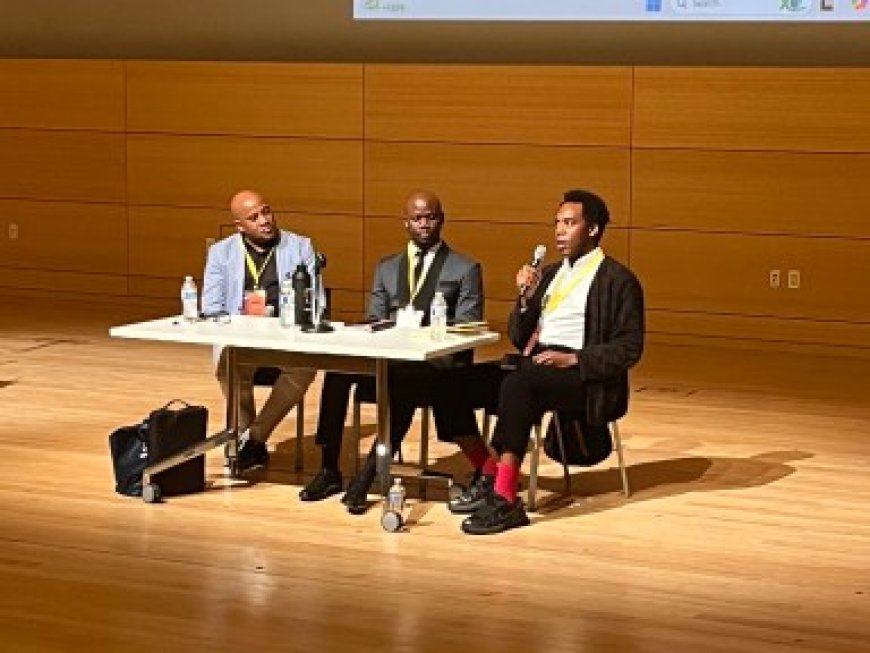Conference panel tackles intersection of immigration, mental health, and race
The annual In My Mind Conference at The New School in Manhattan featured a panel discussion on Oct. 11 about issues facing LGBTQ immigrants, including mental health, racism, and the process of seeking asylum in the United States. The panel discussion, held at the Tisch Auditorium, was moderated by Dr. Julian Watkins, who serves as … Read More

The annual In My Mind Conference at The New School in Manhattan featured a panel discussion on Oct. 11 about issues facing LGBTQ immigrants, including mental health, racism, and the process of seeking asylum in the United States.
The panel discussion, held at the Tisch Auditorium, was moderated by Dr. Julian Watkins, who serves as assistant commissioner at the New York City Department of Health and Mental Hygiene, and featured panelists Shane Tull of Tull Clinical Psychotherapy and Uche Onwa, a queer immigrant who fled his home country of Nigeria in 2017 and sought asylum in the United States.
Watkins noted during the discussion that his experience as someone who grew up with an American father and an immigrant mother, differs from Onwa and others who are not American-born but immigrated to the United States. He called on Onwa to elaborate on the meaning of being forced to leave a country as opposed to those who choose to become expats.
Onwa fled his home country after fearing for his safety due to anti-LGBTQ laws and harsh treatment of queer individuals. The conditions grew to become so dangerous, Onwa said, that authorities vowed to punish anyone who dared to support LGBTQ individuals.
“I was personally attacked a few times,” said Onwa, who previously told Gay City News that he knew he had to flee his home country when men raped his teenage friend for appearing “effeminate.”
But as soon as he arrived in the United States, Onwa immediately faced adversity and experienced what he described as his first encounter with racism and xenophobia. American officials at the border wondered aloud whether Onwa had ebola — simply because he came from an African country — and he was subsequently shackled and held in custody for months before getting released.
Since arriving in America, Onwa has worked for organizations such as the Queer Detainee Empowerment Project and Black Alliance for Just Immigration.
“I’m in a space where even though the journey is not over, I am able to provide support for other people,” Onwa explained.
Tull and Watkins praised Onwa for speaking out about his story — and Tull expanded on the state of mental health in recent years.
Watkins said Onwa’s story highlights an immigration experience that is often overlooked — and he blasted the notion that immigrants “look one way,” referring to the baseless comment Onwa heard about ebola upon arriving to the United States.
“We understand the injury of it all — all the trauma — but it’s not talked about,” Wakins said. “It’s insulting. You have a legal right to seek asylum and you’re met with that.”
Watkins further noted that the city recently released a report on mental health in New York City that shows the way in which anxiety, depression, and other mental health issues have been climbing since the emergence of the COVID pandemic as people have faced greater adversity in their daily lives.
“We see it concentrating in communities,” Watkins said.
Tull echoed Watkins point, saying mental health has become a pandemic within a pandemic.
“I’ve started to think about what has happened to us,” said Tull, who particularly emphasized that men are not paying enough attention to their mental health.
To that point, Watkins stressed the need for mental health professionals to speak to individuals in a relatable way to get through to them — and to tailor their talking points.
“As mental health professionals, we try to speak a certain language,” Watkins said. “Most of our people are not fluent in that language.”
Onwe took that point a step further by pointing out that many immigrants face challenges because they cannot even speak English in the first place. Those barriers can hinder access to services, among other issues.

 Mark
Mark 





